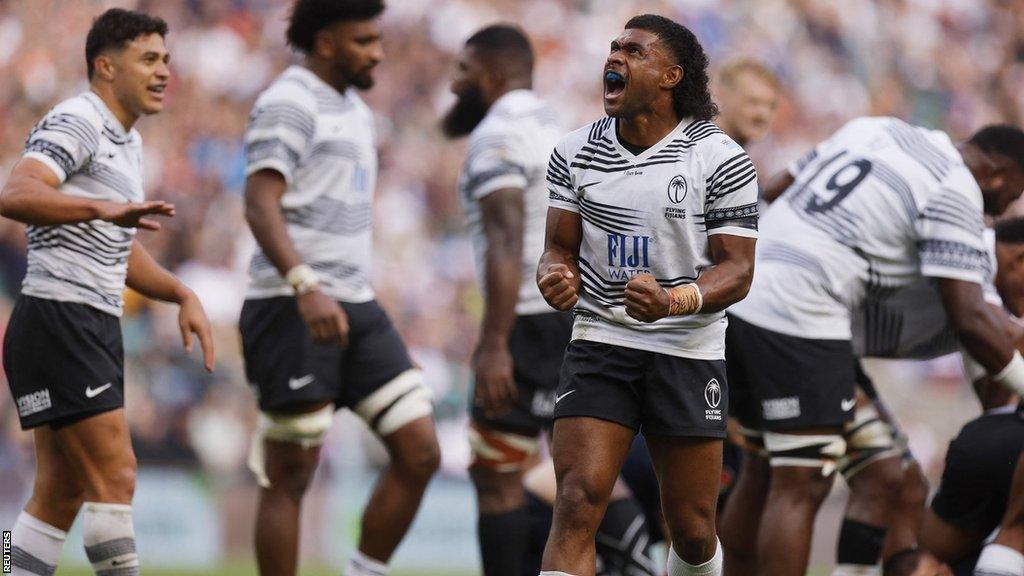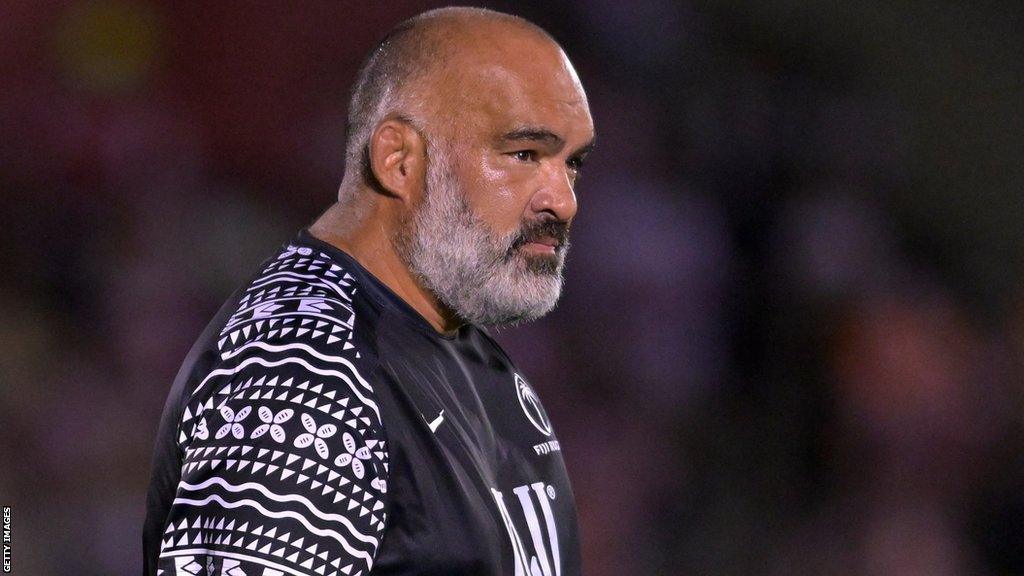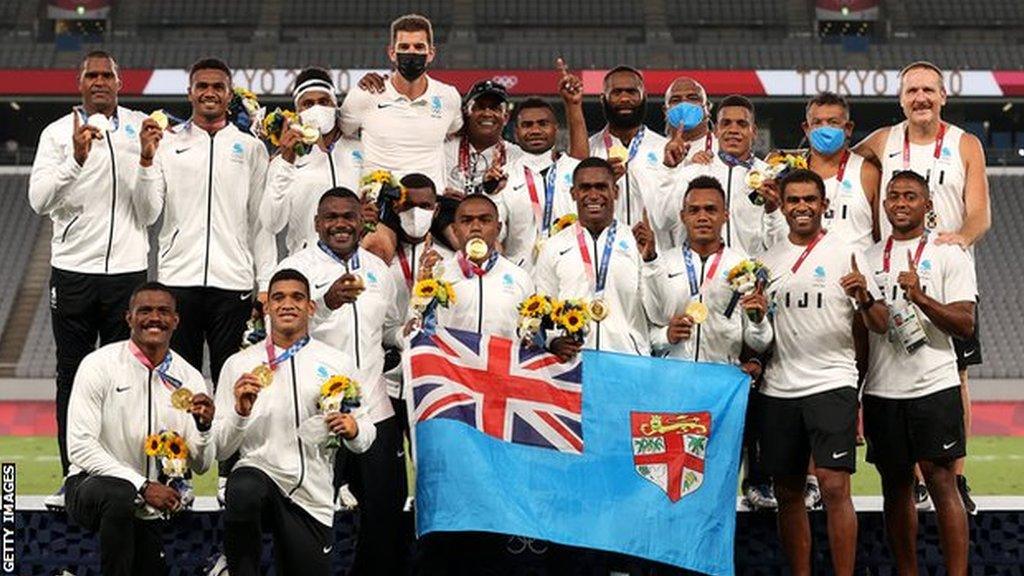Rugby World Cup 2023: Fiji nation to 'stand still' for tournament opener against Wales
- Published

Waisea Nayacalevu scored against Wales in November 2021 in Cardiff
Rugby World Cup 2023: Fiji v Wales |
|---|
Venue: Stade de Bordeaux, Bordeaux Date: Sunday, 10 Sept Kick-off: 20:00 BST |
Coverage: Live BBC Radio Wales, BBC Radio Cymru, BBC Sounds, BBC Sport website & app; live text commentary on BBC Sport website & app. |
Rugby makes the Fijian nation stand still.
That is what will happen on Monday morning when a country settles down to watch their rugby heroes face Wales in the World Cup opener in Bordeaux.
Due to the time difference, Fiji's population of 900,000 on more than 100 inhabited islands will be getting up to watch the journey begin. In any way possible.
"It is a nation that will stand still, especially when it's a Rugby World Cup," said Fiji prop Mesake Doge.
"I would imagine in the villages they will be taking their television sets up onto the hills to get reception to watch the game."
The nation's productivity might be down even though employers are trying to persuade workers to attend their jobs with the lure of breakfast.
"Pretty much some people won't go to work and will just be watching the boys perform," said former Dragons forward Doge.
"For us as Fijians, rugby is such a big occasion. They say rugby can make the nation stand still, so people are looking forward to it."
The Fijian public will not want to miss this tournament, as the South Sea Islanders aim to at least match their exploits in 1987 and 2007, when they reached the World Cup quarter-finals. And it all starts with Wales.
Rugby and religion
Social media videos of the Fiji players singing on the bus on the way to training in France emphasise the relaxed manner within the camp.
Fiji head coach Simon Raiwalui outlined what the sport means to the country.
"Rugby is a religion in Fiji," said Raiwalui.
"Everybody is the coach of Fiji and has an opinion on selection. It's ingrained in our culture and our people will go to any lengths to watch the games.
"If that means taking the boat to go up to the village or travelling to the city, they will find a way. It is one of the beautiful things about Fiji and how it brings people together."
Former Wales boss Wayne Pivac was the Fiji head coach between 2004 and 2007.
"There are two main things in Fiji, rugby and religion," said Pivac.
"Rugby sevens has always been the number one sport in Fiji, followed by 15s, which I think has now caught up."
Pivac was often "advised" who to pick for Wales by the general public but that was slightly different in Fiji.
"They would never give me direct advice in Fiji, the culture wouldn't allow that," said Pivac.
"There's a hierarchical system, if you like. So there was no way they would come and challenge you on the street. They would come in and respect me and say hello with a smile on their face.
"So I wouldn't get the 'advice' and the 'help' I got in Wales. But you knew everyone had an opinion."
Welshman Gareth Baber guided Fiji to Olympic sevens gold in 2021.
"Rugby is a massive source of national identity and pride. Every Fijian has an opinion on rugby," said Baber.
"Life is quite humble there and they are communal. Fiji is a beautiful place which is both ridiculous and fantastic at the same time. That's why people fall in love with it."
Style and substance

Fiji are the top-ranked side in Pool C - ahead of both Australia and Wales
Fijian rugby has always been known for its flair but Raiwalui has also looked to instil discipline, without taking away the X-factor.
"We have been working hard on discipline and the physical aspect but we still want to play like Fijians," said Raiwalui.
"We always have talent but it is about getting the key things right, like fitness, so we could play rugby at a high level.
"We have traditionally been a team that plays in spurts and our priority is to play against the top teams for 80 minutes.
"A lot of teams will say wait for the 30-minute mark and see Fiji tire or lose discipline. We are trying to eradicate that.
"We have worked hard on our set-piece and our scrum and lineout have been going well. We have worked hard on the basics so we have the foundations to free up our play."
Fiji captain Waisea Nayacalevu says he has seen the difference from previous Fiji teams.
"It is more settled and we have been gelling well," said Nayacalevu.
"Fijians like playing a free style of rugby, that's what we want to do while keeping our structure."
Homegrown talent

Fiji celebrate victory against England at Twickenham in August 2023
Fiji's development has been aided by the creation of Super Rugby Pacific's Fijian Drua.
The Drua reached the Super Rugby quarter-finals in their second season in June, losing to eventual winners the Crusaders.
Raiwalui has named a squad with 18 of his 33 players Drua-based players.
"The Drua has been a great benefit," said Raiwalui.
"We have been able to blood up to 50 players at Super Rugby level and you will only see the benefits.
"There is continuity and we have the combination now of overseas players also performing at the highest level.
"Traditionally we have had success in the sevens but it's about being more consistent at the XV."
Baber believes the Drua has helped the process of translating the success of sevens towards the longer format.
"The sevens obsession has always been there because it's so visible," said Baber.
"What has happened now is the Drua have made that connection for people in terms of 15-a-side.
"Having a team on the island means this form of the game is visible throughout the Super Rugby season and that has elevated the level of interest.
"You see players who are now living in Fiji playing Super Rugby, and you're also getting international teams coming over to play. That did not happen before."
World Cup preparation
The desire to connect with Fijian life meant World Cup preparations began on home soil with a heavy fitness regime. This included a video of the squad tackling sand dunes together in formation going viral.
"We got our players back to Fiji to prepare," said Raiwalui.
"We went back to our origins, not at a hotel with all the fancy mod-cons.
"We connected to who we are and what we play for. It was a big part of our preparation and put us on a good footing.
"The boys have been great and done everything we have asked of them. We have pushed them to the limits.
"We have made a huge improvement in the couple of months and made the best of what we have."
Are Fiji favourites against Wales?

Fiji head coach Simon Raiwalui used to play club rugby in Wales for Newport
This Fiji outfit are probably the most prepared side from their shores to arrive at a World Cup, after warm-up victories over Tonga, Samoa, Japan and most notably England, with only one defeat against France.
The historic first win at Twickenham has lifted them to seventh in the world rankings, making them the highest placed team in Pool C going into the tournament, above Australia and Wales
"Rankings don't bother me," said Raiwalui.
"They are a product of consistent work and it's good if your rankings are going up.
"This is one of the best prepared Fiji squads going to a World Cup and being able to play against England and France is huge for us after Japan, Tonga and Samoa.
"England was not the complete performance, there was more to come."
Baber, who has just returned from Fiji after working for World Rugby on a two-week project, believes Raiwalui's side will respect Wales but insists there is an expectation on this squad.
"Fiji are still a tier-two nation and Wales are tier one and the group will be reminded about that this week," said Baber.
"They won't see themselves as favourites, even though people around it might talk. They'll know they're playing against one of the top teams in the world, and that's how they view the Welsh, and the respect they give.
"Saying that, the Fijian public generally have a high expectation of their teams and that is there now.
"You get a lot of players playing in high-profile positions in European rugby, especially over the last five or 10 years.
"They believe their players have the abilities to progress out of that pool and Simon will have them grounded and confident."
Four months, not four years planning

Simon Raiwalui competes for the ball for Newport in their 2001 Principality Cup final against Neath
Former Fiji lock Raiwalui, 48, took over from Vern Cotter as head coach in February after the New Zealander resigned.
Raiwalui was the general manager of Fiji rugby but had established himself as a well-respected coach having enjoyed successful stints with Stade Francais, Racing 92 and Australia.
"For me it has been a four-month cycle rather than four-year cycle," said Raiwalui.
"I had that connection with the squad in my previous role as general manager. The key thing was prioritising what was important."
Fiji have lost coaches in World Cup year before, notably when now Pivac resigned in January 2007 before the tournament in France that year.
Raiwalui also has a past in Wales having played for Newport at the turn of the century between 1999 and 2003 during a career which saw him play 39 internationals for Fiji.
"Having played in Wales, it is very similar with how family-orientated and tribal it is," said Raiwalui.
"I loved my time there and the people I met."
Divided loyalties

Gareth Baber is lifted up by the Fiji Rugby Sevens squad, who defended their Olympic crown in Tokyo
So rugby links between Fiji and Wales remain. Doge played for the Dragons and assistant coach Seremaia Bai was waxing lyrical this week about his time with Cross Keys.
Baber's last major act of his five-year love affair with Fijian rugby was to lead the 15-a-side national team against Wales at the Principality Stadium in November 2021.
Baber headed up a temporary coaching staff because then head coach Cotter and the other southern hemisphere-based coaches were not involved due to travel restrictions.
It was a match the hosts won 38-23 and was the last time Wales and Fiji faced each other. So how will Baber feel when he watches the game?
"Conflicted," said Baber.
"There's an emotional attachment with Fiji, it was a huge challenge we went through as a family, but we had some fantastic times there and when I go back I've got strong relationships with players and coaching staff.
"But my home is Wales and that means so much. Ideally it would be a draw with both teams going through to the quarter-finals, but it's hard to dream for that."
The Fiji captain also has a dream.
"We want to make history in this World Cup for Fiji and us as a group, that's our main goal," said Nayacalevu.
The Fijians will be getting up early in the hope of watching that happen.